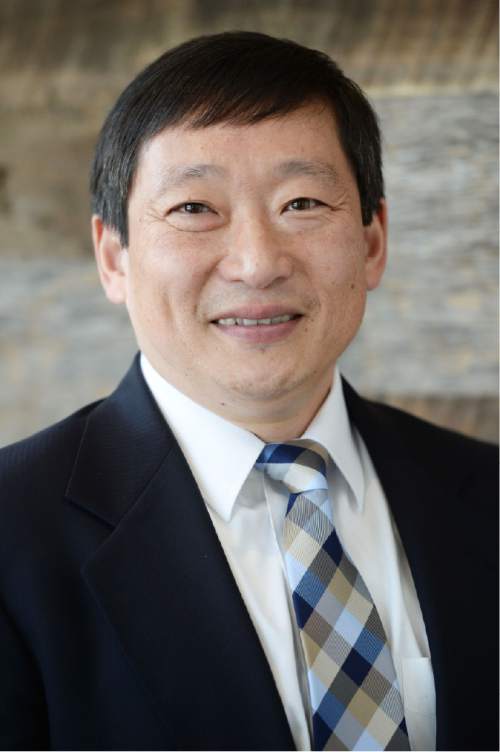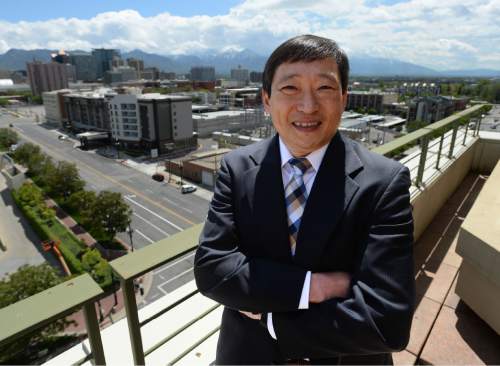This is an archived article that was published on sltrib.com in 2016, and information in the article may be outdated. It is provided only for personal research purposes and may not be reprinted.
Chia-Chi (pronounced CHA-Chee) Teng says he's challenging Rep. Jason Chaffetz in the 3rd Congressional District GOP primary to preserve Americans' ability to fight tyranny at home and abroad — something he says he knows about because his parents were forced to flee Communists in China.
After World War II, when Communists seized power, his mother was able to escape with her family to Taiwan. His father was the only member of his extended family to make it there.
"For about 40-plus years, they knew nothing about how their parents and relatives were doing, because it wasn't open," he says. Finally, they heard about tragedies.
"Many of them died in the Cultural Revolution through starvation or persecution, or were sent to labor camps never to be heard of again," Teng says.
"We really need to give people power to fight tyranny. I really believe that this is one of the greatest things in America, that people have so much more power than in a country like China," he says. "We can balance the potential tyranny that can be forced upon us."
Teng says he worries that Congress — and Chaffetz — is becoming less of a protector and more of a hindrance to freedom. "I feel like spending is out of control, the regulation is out of control, and Mr. Chaffetz has joined the Washington, D.C., establishment."
—
Living the dream • "I have lived the American dream," says Teng, 53, who worked as a Microsoft engineer — apparently becoming wealthy — and now is a professor at Brigham Young University.
"I am a personal example of American exceptionalism," he says, referring to the belief that the United States is a model of freedom with a special role to help transform the world.
"My first interaction with American culture was two American missionaries knocking on my door when I was 8 years old," he recalls, adding that his family later became Mormons.
He earned a bachelor's degree in electrical engineering from Taiwan's National Tsing Hua University, which the United States founded with money it was given for reparations in the 1900 Boxer Rebellion against Western institutions.
"America was one of eight countries that received some indemnity. All the other seven countries basically took the money and ran, and America was the only one that said, 'We want to give the money back,' " he says. So it founded what became "one of the top research and science and technology schools in the world today."
Teng finished college, served in the military and completed an LDS mission. "I was planning on going to graduate school, and a friend of mine started a software company and needed help. So I went to help."
A few months later, their company was acquired by Microsoft — and the software giant moved Teng to its Seattle headquarters. "That's how I ended up in America. It wasn't something that I planned. It just serendipitously happened."
He worked at Microsoft for 17 years until retiring with enough wealth to personally loan his congressional campaign $227,000 leading up to the state GOP convention in April.
When asked if he is a millionaire, he simply laughs and says, "I did OK." He adds he is able to self-finance his campaign through the general election, if necessary.
—
Giving back • After retiring from Microsoft in 2005 and earning a doctorate from the University of Washington in 2007, Teng decided to move to Utah and teach at BYU beginning in 2008. "It's an opportunity for me to give back," he says.
He sees possibly serving in Congress "as another opportunity for me to give back and make a difference," and that "I truly believe that when more is given, more is required. I've been so richly blessed over the last 27 years since I've been in this country. I've been given more than my wildest imagination."
Joseph Ekstrom, another BYU professor who helped to hire Teng, says, "He is one of the most well-liked teachers here. I wouldn't say he's popular, because he has a tendency to be fairly rigorous in his approach, and we have some students who don't like to be told that they didn't get it right."
He adds, "But the people who work with him and do what he says all think he's great."
He advises people not to think they are entitled to anything in dealing with him. "His attitudes about entitlement are pretty strong, as with most immigrants who have worked hard for what they have."
Ralph Yarro, CEO of ThinkAtomic, says he has worked on several international business deals with Teng through the years.
"He is a straight shooter. He is very practical and matter-of-fact. He is an honest person — the kind of guy you would want to do business with," he says. "He knows how to look at numbers from an economic or business perspective, whether to fund something, or where to cut. He knows how to run a business."
Teng, who speaks with a light Chinese accent and a constant smile, outlines his goals if elected.
First, he wants to tackle "the out-of-control overspending in Washington and the national debt. We're at $19 trillion today, and from the last six months alone, our national debt increased by $1 trillion. Mr. Chaffetz continued to vote for those trillion-dollar omnibus spending bills."
Next, he wants to slash government regulation.
—
Reform • "I'm going to go there and look for an opportunity to deregulate and release the burden that's been forced upon small startup businesses and entrepreneurs who have innovative ideas."
Among his other priorities is immigration reform.
"I came to America legally on a work visa, received a green card, and many years later gained full citizenship. Through it all we have been productive, English-speaking, taxpaying members of society," Teng says on his website.
"Immigration reform is needed now more than ever for the security of the nation. We need to secure the porous borders, which means more technology and more patrols."
Teng also vows to push the federal government to turn over its public lands in Utah to the state, to return more education policy to the states, oppose abortions except for medical reasons, and to protect gun rights.
Teng is appearing in the June 28 GOP primary because of a new state law, SB54, which allows candidates to qualify either by gathering enough signatures or through the traditional convention-caucus system.
Teng attempted to use both methods. He successfully collected the required 7,000 signatures in part by spending $56,200 on paid signature gatherers.
But delegates at the Utah Republican Convention voted for Chaffetz over Teng by a 64 percent to 36 percent margin. In past years, winning 60 percent of delegate votes would have eliminated Teng and sent Chaffetz directly to the general election.
Teng says delegates appeared to be penalizing him for also using the signature-gathering route, which they dislike and the Republican Party has fought in court.
"We still were only about 40 votes short in the convention," he says. "I obviously was being punished for collecting signatures. I am confident that if we didn't collect signatures, we would have passed the 40 percent threshold."
He says he doesn't regret collecting signatures. Every day, signature gatherers reported questions they heard, and the campaign would send out answers. Besides, door-to-door canvassing was a great way to build grass-roots backing.
"I got 8,000 registered Republicans to put their names on a piece of paper to say they would support and nominate me," he says. "They become a great foundation for me to build my grass-roots support for the primary run. This is why I chose to do it the way we did." —
Chia-Chi Teng
Age: 53
Family: Married, four children.
Education:
• Doctorate, electrical engineering, University of Washington (2007)
• Master's, electrical engineering, University of Washington (1993)
• Bachelor's, electrical engineering, National Tsing Hua University in Taiwan (1985)
Experience:
• Associate professor, information technology, BYU, 2008-2015
• Visiting associate professor, computer science, National Tsing Hua University, Taiwan, 2013
• Software development engineer/manager, Microsoft Corp., 1989-2005
Interesting Facts:
• His parents fled to Taiwan to escape Communists in China.
• His first experience with any Americans was when Mormon missionaries knocked on his door at age 8.





